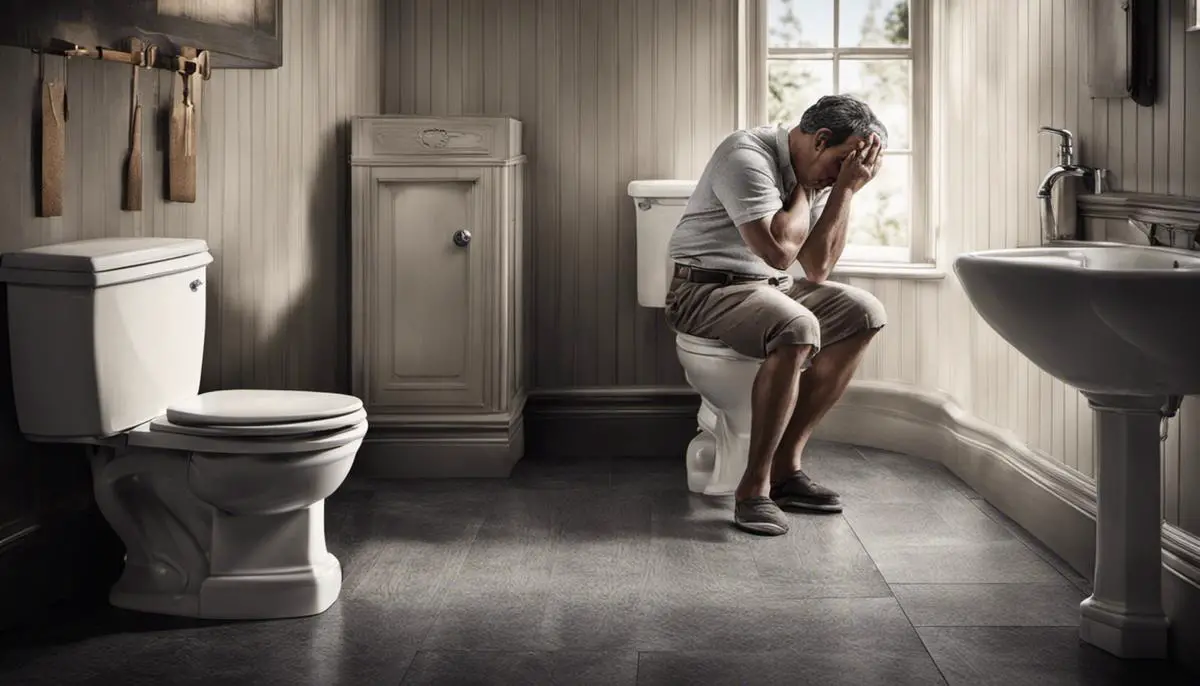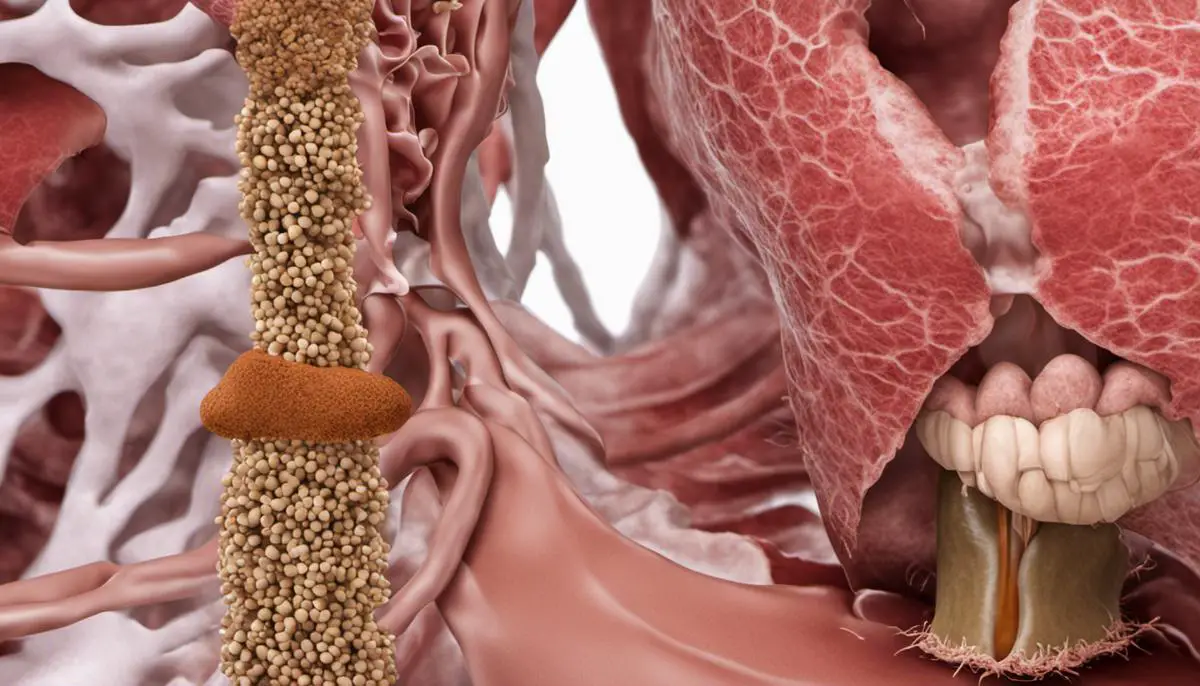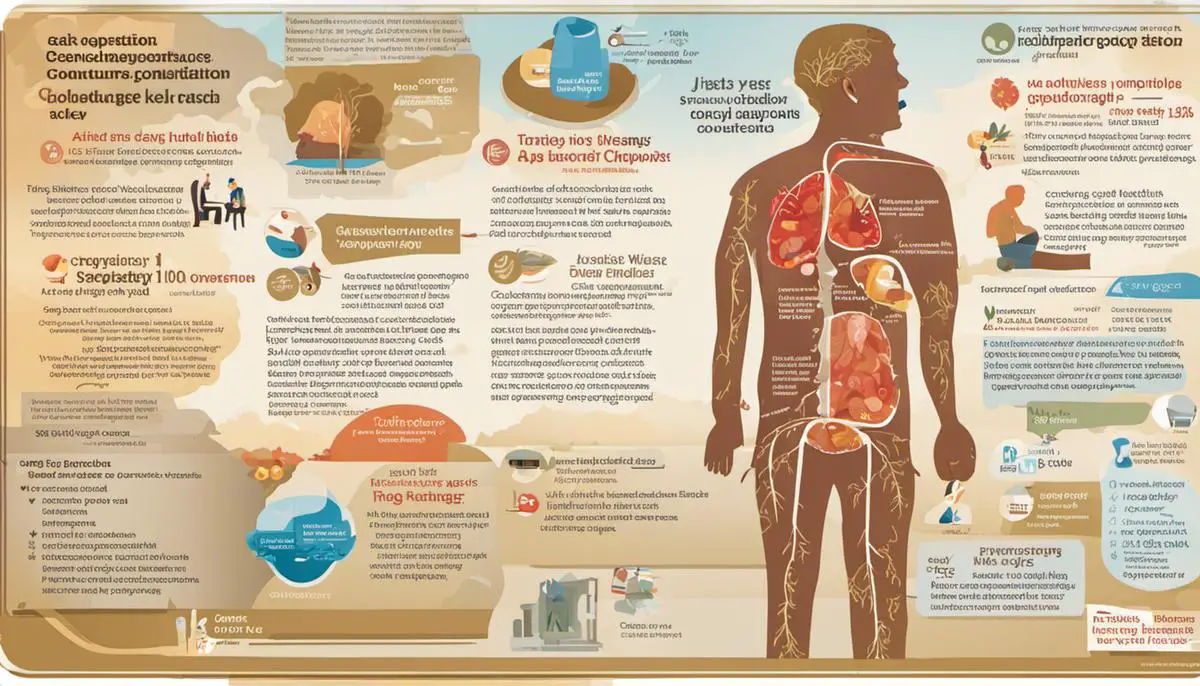As we delve into understanding chronic constipation, it becomes apparent that this common affliction can have a profound effect on everyday life. Chronic constipation is more than just an occasional nuisance; it is characterized by persistently hard, difficult-to-pass stools, abdominal pain, and infrequent bowel movements. This condition significantly diverges from standard, occasional constipation in its consistent presence and debilitating impact. While many only experience temporary bouts of constipation, it is important to recognize when such symptoms take a turn towards a chronic problem. This chronic form of constipation is influenced by factors ranging from lifestyle habits and dietary choices to underlying medical conditions and specific medications and even physical aspects like age.
Understanding Chronic Constipation
What is Chronic Constipation?
Chronic constipation is a common condition where individuals consistently experience difficulty in bowel movements over a prolonged period. It’s not a rare heath concern, with about 16 out of 100 adults in the United States diagnosed with this condition. Experts generally mark constipation as ‘chronic’ when a person experiences symptoms for several weeks or longer.
Characteristics and Symptoms of Chronic Constipation
A person suffering from chronic constipation may find it strenuous to pass stools or might not have a bowel movement at all for several days. The bowel movements might be infrequent – less than three times a week. The stool could often turn out to be hard or lumpy, causing discomfort. Other characteristic symptoms include bloating, feeling the bowel does not empty completely, or experiencing a blocked feeling in the rectum.
Differences Between Chronic and Occasional Constipation
Occasional constipation and chronic constipation differ in terms of duration and symptom frequency. Occasional constipation is typically short-term and usually resolves on its own or with minimal intervention. It can be due to temporary changes, such as a diet change or stress.
On the other hand, chronic constipation persists for several weeks or more, where the sufferer experiences symptoms persistently. This form of constipation is typically the result of an underlying medical condition or a side effect of certain medications.
When is Constipation Considered Chronic?
Constipation is generally considered chronic when a person experiences two or more of the following symptoms for at least three months: straining during bowel movements, lumpy or hard stools, feeling of incomplete evacuation, sensation of rectal blocking, manual maneuvers to facilitate bowel movements, and fewer than three bowel movements per week.
Understanding the Causes of Chronic Constipation
Chronic constipation can transpire due to a myriad of reasons, both physiological and lifestyle-related. Sometimes, it’s linked to problems with the digestive tract, such as obstructions in the colon or rectum, rectal cancer, or neurological disorders like Multiple Sclerosis, Parkinson’s disease, or stroke.
Hormonal imbalances may also give rise to chronic constipation. Conditions like hypothyroidism and diabetes, or elevated levels of estrogen and progesterone during pregnancy can inhibit the regular movement of stool through the colon.
Some medications, including antacids, high blood pressure drugs, and certain pain medications, can usher in chronic constipation as well. Moreover, lifestyle factors like inadequate hydration, a diet deficient in fiber, low physical activity, advancing age, and neglecting the natural call of bowel movement can similarly lead to this condition. Lastly, it’s worth noting that psychological afflictions like depression, anxiety, and some eating disorders can instigate chronic constipation.

Lifestyle Factors and Diet
Your personal habits and lifestyle choices significantly influence the prevalence of chronic constipation. This incorporates aspects like dietary habits, the amount of fluids you consume, your level of physical activity, stress management techniques, and psychological factors. Hence, an awareness and management of these areas could help in the mitigation and treatment of chronic constipation.
Importance of a Balanced Diet
Firstly, the importance of a balanced diet in managing bowel movements cannot be understated. Dietary fiber adds bulk and softness to the stool, leading to less strain during bowel movements. Studies have shown that diets low in fiber content are often associated with constipation. Foods rich in fiber include fruits, vegetables, whole grains, and legumes. Conversely, diets high in processed foods, meat, and dairy products may increase the risk of chronic constipation because they are typically low in fiber and high in fats.
Water Intake
Water intake is another important lifestyle factor to consider. Adequate hydration is necessary for bowel health as it helps soften the stool, making it easier to pass. Chronic low water intake may lead to harder stool and consequently, increase the risk of constipation. Inadequate hydration coupled with a low-fiber diet can dramatically increase the risk for chronic constipation.
Physical Activity: An Essential Component for Bowel Health
Insufficient physical activity is another common contributor to chronic constipation. Regular physical activity can increase the speed of digestion as well as stimulate the muscles in the intestines, helping move stool through the body more quickly and reducing the amount of water the body absorbs from the stool.
Participating in regular physical activity such as walking, swimming, cycling, or other forms of cardiovascular exercises not only promotes overall health but also supports a healthy digestive system and can help alleviate symptoms of constipation.
The Influence of Stress and Daily Routines on Chronic Constipation
Chronic stress and certain daily routines can impact bowel movements and contribute to chronic constipation. Evidence suggests that prolonged periods of stress can alter various bodily functions including digestion, leading to constipation.
Individuals who frequently suppress the urge to have a bowel movement due to hectic schedules or uncomfortable situations may also experience constipation. Over time, suppressing the urge can cause the body to “forget” the urge to defecate, leading to constipation.
Conclusion
To conclude, a blend of lifestyle modifications can play a significant role in managing and preventing chronic constipation. Adapting your dietary habits, maintaining an adequate hydration level, incorporating regular exercise into your routine, effectively managing stress, and sticking to a healthy daily routine are all essential to cultivating regular bowel movements and averting the onset of chronic constipation.

Medical Conditions and Medications
Thyroid Conditions as a Cause of Chronic Constipation
In consideration of medical causes, one should note that disorders like Hypothyroidism can lead to chronic constipation. This condition involves the thyroid gland’s inability to generate sufficient thyroid hormone, which greatly impacts the body’s metabolism, including waste processing and elimination. A diminished production of thyroid hormone can result in a sluggish digestive process, thereby inducing constipation.
Neurological Disorders and Chronic Constipation
Neurological disorders such as Multiple Sclerosis (MS), Parkinson’s Disease, and strokes can all lead to chronic constipation. These conditions can alter the function of the nerves in the colon, which can affect the body’s ability to move stool through the digestive tract properly. When the stool moves through the colon slower, more water gets absorbed, making the stool hard and dry, thus leading to constipation.
Additionally, spinal cord injuries can damage the nerves that control the muscles responsible for bowel movements, thereby causing constipation. Furthermore, conditions such as Autonomic Neuropathy, a condition where the nerves that manage body’s automatic functions get damaged, can lead to chronic constipation and other complications.
Mental Health Conditions and Chronic Constipation
Depression, a common mental health condition, can also be associated with chronic constipation. People with depression might experience a slowdown in their digestive system. This slowdown can make constipation more likely. In addition, some people with depression may have a reduced appetite and do not get enough fiber or water in their diet, which are essential components to promote regular bowel movements.
Medications and Chronic Constipation
Certain medications can cause constipation as a side effect. These medications include certain types of antidepressants, iron supplements, and certain blood pressure medicines. Constipating drugs include narcotic pain medications like opioids, some antidepressants, and certain antihypertensives.
Moreover, calcium channel blockers used for heart disease and hypertension, anticholinergics/antispasmodics prescribed for urinary incontinence, depression, and allergies as well as antacids that are rich in calcium or aluminum can cause constipation.
In addition, overuse of over-the-counter laxatives can also lead to constipation. Initially, laxatives may alleviate constipation, but the body can become dependent on them over time, where natural bowel movements become difficult without the use of laxatives leading to chronic constipation.
Conclusion
Generally, managing underlying health conditions, changing medications under a healthcare provider’s guidance, or maintaining a diet high in fiber combined with adequate hydration, can aid in alleviating symptoms of chronic constipation. It is important to note, however, if symptoms continue to persist, it would be advisable to consult with a healthcare provider for further professional advice and treatment options.

Age and Other Physical Factors
Age-Related Factors Contributing to Chronic Constipation
Chronic constipation can be an increasing likelihood as individuals age due to various factors. The natural decrease in metabolic rate that accompanies aging can impact the overall rate of digestion and contribute to chronic constipation. Additionally, lessened mobility from a sedentary lifestyle or the presence of conditions that impair mobility, like arthritis – common in the elderly, limit physical activity. As regular physical activity assists in promoting bowel movements, a decline in mobility can result in a higher propensity for chronic constipation.
Additionally, changes in the digestive system become more apparent in older adults. The most frequently observed change is a decrease in the gut’s muscle tone. Just like other muscles, gut muscles lose efficiency and strength with age, leading to slower transit of food waste. This in turn can cause a hardening and drying of stool, resulting in constipation.
Moreover, certain diseases that are prevalent in older adults, including diabetes and Parkinson’s disease, can lead to chronic constipation. These conditions often impact the autonomic nerves that control intestinal muscles, slowing the intestinal transit process and consequently causing constipation.
Understanding Physical Causes of Chronic Constipation
Chronic constipation may be caused by a range of physical problems, particularly those relating to muscular function and nerve stability within the digestive system. For instance, conditions such as pelvic floor dysfunction, where the muscles in the pelvic area fail to relax and coordinate effectively for bowel movement, often result in chronic constipation. It’s also not uncommon for weak abdominal muscles to cause the condition, as their lack of strength can inhibit bowel movements.
Issues tied to our nervous system also play a significant role. Conditions that affect the nervous system, like Multiple Sclerosis, a stroke, or spinal cord injuries, can damage nerves. This damage can create a disconnect between our brains and the muscles in our intestines, leading to a lack of control, ineffective contractions, and poor coordination, all of which can cause constipation.
There are also times when chronic constipation can be a result of an imbalance in gut bacteria. Plus, it’s important to note dietary habits and lifestyle decisions directly affect bowel movement regularity. Lack of hydration, consuming a diet low in fiber, or making drastic alterations to one’s eating patterns can produce hard stools and disrupt normal bowel movements. Similarly, irregular eating habits can cause interruptions in the ‘gastro-colic’ reflex, which prompts bowel movements following a meal.

Prevention and Treatment Options
Managing Chronic Constipation with Diet and Lifestyle Adjustments
One incredibly helpful method of managing chronic constipation involves making simple yet effective changes to diet and lifestyle. Primarily, one should aim to increase the consumption of foods that are high in fiber. Whole wheat bread, brown rice, a variety of both fruits and vegetables, and beans, are all excellent sources of fiber. It’s equally important to stay hydrated, albeit with non-caffeinated beverages as drinks like coffee or fizzy drinks can exacerbate constipation.
Embracing a physically active lifestyle can help significantly relieve symptoms of chronic constipation. Besides the various health benefits regular exercise provides, it also helps to stimulate intestinal activity, thereby promoting regular bowel movements.
Home Remedies
Several home remedies can prove beneficial to individuals with chronic constipation. One such remedy is the addition of probiotics to your diet, which can enhance gut health by introducing healthy bacteria. Probiotics can be obtained from foods such as yogurt, kefir, sauerkraut, and supplements. Another remedy includes drinking warm liquids, particularly in the morning, as this can help stimulate bowel movements.
Over-The-Counter Treatments
Over-the-counter (OTC) treatments are also an effective way to combat chronic constipation. These encompass stool softeners, fiber supplements, and laxatives. Stool softeners like docusate sodium (Colace) moisten the stool by drawing water into the colon, which can assist in easy passage. Fiber supplements such as Psyllium (Metamucil) or Methylcellulose (Citrucel) can augment the water content and weight of the stool allowing easier, quicker passage. Laxatives, like Bisacodyl (Dulcolax), are also an option, but they should be a last resort as frequent use can lead to dependencies.
Prescription Medications
For more severe cases of chronic constipation, prescription medications may be needed. These can work in several ways to alleviate this condition. For instance, drugs like Linaclotide (Linzess) and Lubiprostone (Amitiza) increase the amount of fluid in your intestines, which can help ease the passage of stool. Others like Prucalopride (Motegrity) can stimulate muscle movement in the intestines.
Potential Surgical Interventions
Surgical interventions for chronic constipation are generally considered as a last resort when all other treatments have failed to give relief. These surgeries can range from removing a section of the colon, anorectal surgery, or implementing a stoma, where a section of the intestine is brought out from an opening (stoma) made in the abdominal wall to allow feces to exit the body. It’s crucial to understand that each of these procedures carries potential risks and complications, and should be discussed thoroughly with a healthcare provider beforehand.

Despite its difficulty and inconvenience, there are a wide variety of prevention methods and treatment options available for chronic constipation. From implementing changes in diet and lifestyle, using home remedies, to over-the-counter products, prescription medications, and in certain cases, surgical interventions, there’s a solution to accommodate varying severity levels of this stubborn condition. As noted throughout, the impacts of physical factors, lifestyle and diet, medical conditions, and medications all play key parts in both the advent and treatment of chronic constipation. Ultimately, the more we understand about the complexities of chronic constipation, the better equipped we are to combat its effects and improve overall health.
